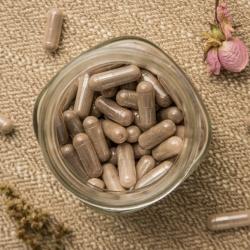
Many animals eat their placenta after birth. Zoologists know this is to ward off predators, but when the "natural" birth movement took off in the 1960s, believers stated that if animals do it, it must be for a health reason and humans should also.
Among the fringe in rich Western countries, this "maternal placentophagy" has been with us ever since, and it has become so common some make placenta-based smoothies and meals and even buy placenta in pill form. But it doesn't do anything positive and carries some risk. Animals certainly do not do it to elevate their mood or prevent postpartum depression, which has become the popular argument among the health groups who embrace it.
Another paper debunking it might get wealthy new mothers to stop engaging in shamanistic beliefs about medicine simply because Kim Kardashian or January Jones or Samantha Bee says so. A tiny study in Women and Birth, a publication for midwives, started in week 36 of pregnancy and gave 12 women placenta capsules in the weeks after giving birth while 15 took placebo capsules. Saliva samples were taken and questionnaires completed. There was no difference in postpartum 'baby blues' or depression in the new mothers. Previously the group had already debunked claims placenta supplements were a better source of iron than anything else.
Postpartum depression of varying degrees is obviously real but it has everything to do with lack of sleep, an abundance of stress, and little social support since the miracle of human birth has occurred about 13 billion times. Not to mention activists scaring and shaming new parents into worrying about everything. It has nothing to do with whether or not a placenta was eaten. And the risks are not worth it, as the case study of a child who got sepsis twice because of placenta pills showed.
This fad will not leave us, though. In 2017 we can detect almost anything and the scholars were able to detect a slight but meaningless change in hormone concentrations. Among a junk science community (Pete Myers, et al.) that believes endocrine disruption at trace levels - fancy sounding homeopathy - is a real concern, this will be enough to keep those supplements selling.
References:
Sharon M. Young, Laura K. Gryder, Chad Cross, David Zava, David W. Kimball, Daniel C. Benyshek, 'Placentophagy’s effects on mood, bonding, and fatigue: A pilot trial, part 2', Women and Birth (in press November 27 2017 DOI:http://dx.doi.org/10.1016/j.wombi.2017.11.004
Sharon M. Young, Laura K. Gryder, Chad Cross, David Zava, David W. Kimball, Daniel C. Benyshek, 'Effects of placentophagy on maternal salivary hormones: A pilot trial, part 1', Women and Birth (in press November 27 2017) DOI:http://dx.doi.org/10.1016/j.wombi.2017.09.023



